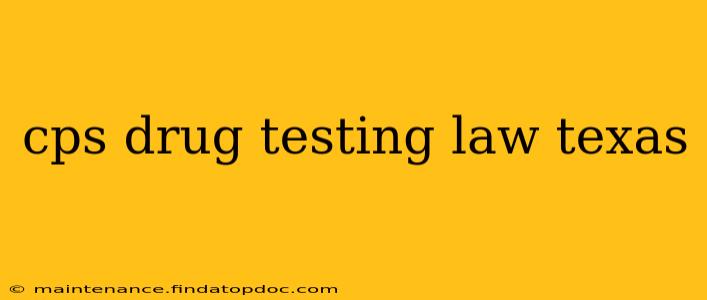The Texas Department of Family and Protective Services (DFPS) plays a crucial role in protecting children. A key aspect of this involves investigating allegations of child abuse and neglect, and drug use by parents or caregivers is often a significant factor in these investigations. This guide explores the legal framework surrounding drug testing in Texas CPS cases, aiming to clarify common questions and concerns.
What are the Texas CPS Drug Testing Laws?
There isn't a single, overarching law mandating drug testing in all Texas CPS cases. Instead, the legality and appropriateness of drug testing are determined on a case-by-case basis, depending on the specifics of the allegations and the judge's discretion. DFPS caseworkers will assess the situation and make recommendations to the court, which ultimately decides whether drug testing is warranted. The focus is always on the child's best interests. The absence of a blanket law reflects the need for a nuanced approach that considers individual circumstances.
Can CPS Force Me to Take a Drug Test in Texas?
While CPS cannot force you to take a drug test without a court order, refusing a court-ordered drug test can have serious consequences. A judge may order drug testing if they believe it's relevant to determining the safety and well-being of the child(ren) involved. Refusal to comply can be interpreted as non-cooperation and could lead to further investigation, potential removal of the child(ren) from your care, or other adverse actions. It's crucial to understand that cooperating with the legal process, even if you are innocent, can significantly impact the outcome of your case.
What Happens if I Fail a CPS Drug Test in Texas?
The consequences of failing a court-ordered drug test in a Texas CPS case can be severe and vary depending on several factors, including the specific drug(s) involved, the frequency of use indicated by the test results, and the judge's assessment of the overall situation. Possible consequences can range from mandatory drug rehabilitation programs and increased supervision to the temporary or permanent removal of your children from your care. The court will prioritize the safety and well-being of the child(ren) when making these decisions. The specific repercussions are determined on a case-by-case basis.
Does CPS Need Probable Cause to Drug Test in Texas?
While a formal probable cause determination isn't always explicitly stated, the court needs reasonable suspicion or evidence suggesting drug use that is relevant to a child's safety to justify a court-ordered drug test. This evidence may stem from witness statements, observations by caseworkers, or other factors relevant to the case. The judge's decision will be based on the totality of the circumstances presented. The threshold is lower than the standard required for a criminal charge but still requires sufficient evidence suggesting a connection between drug use and potential harm to the child.
What are My Rights During a CPS Drug Testing Investigation in Texas?
You have several critical rights during a CPS investigation, including the right to legal representation. It is strongly advised to seek legal counsel as early as possible. An attorney can help you understand your rights, navigate the legal processes, and advocate for your best interests. You also have the right to remain silent, although cooperation is generally encouraged. Remember, anything you say can be used against you in court, so it's essential to exercise caution and seek legal guidance before making any statements to CPS investigators or the court.
Can I Refuse a Drug Test if I'm Not the Parent?
Even if you're not the legal parent or guardian, but you have regular caretaking responsibilities for a child, you could still be subject to a court-ordered drug test if CPS determines it's relevant to the child's safety. The court's focus remains on protecting the child, regardless of your legal relationship to them. Refusal to cooperate might lead to similar consequences as it would for a parent.
This information is for general educational purposes only and should not be considered legal advice. It's crucial to consult with an experienced Texas family law attorney to discuss your specific circumstances and receive tailored legal guidance. They can explain your rights and help you navigate the complex legal processes involved in Texas CPS cases.
